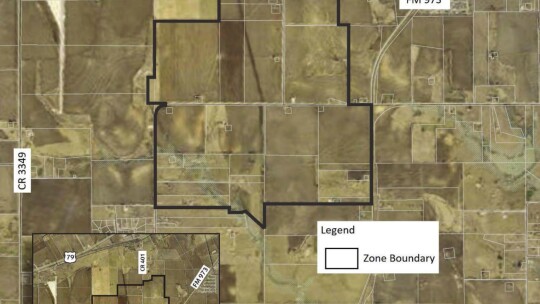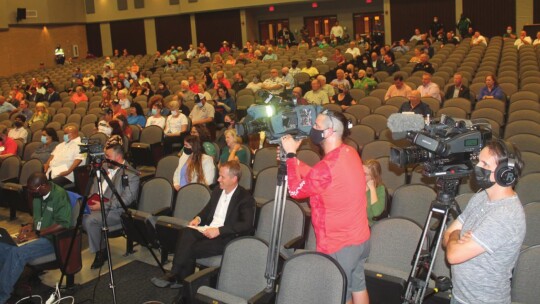There was a lot to unpack last Thursday regarding agreements, ordinances and potentially tax abatements for more land for Samsung Austin Semiconductor’s planned Taylor plant, and city leaders split on some actions.
Agenda actions taken
To review, on July 14, the City Council voted 3-2 on an ordinance to designate Reinvestment Zone No. 9, with council members Mitch Drummond and Dwayne Ariola voting opposed and council members Brandt Rydell, Robert Garcia and Gerald Anderson voting in favor.
The council then voted 4-1, with Ariola opposed, to:
• authorize the mayor to execute two new agreements. One agreement is a Chapter 380 agreement to allow for incentive payments from use tax generated by Samsung on their properties. The other agreement is a project donation agreement with Samsung to donate and escrow all costs associated with the installation of water and sewer utilities to their site. Amendments to existing chapter 212 and 311 agreements as well as a development review reimbursement agreement were approved;
• authorize an economic development performance agreement between the Taylor Economic Development Corporation (EDC) and Samsung Austin Semiconductor, LLC; and
• adopt an ordinance to amend and expand the boundaries of Tax Increment Reinvestment Zone No. Two.
The items included a public hearing, specifically in regards to expanding the boundaries of Reinvestment Zone No. Two, that saw no public input. However, during the citizen communications portion of the meeting, Jackie Krueger spent part of her time to discuss Samsung and for people she says did not believe it does any good to go and speak at a council meeting despite previous public hearings and opportunities to speak on Samsungrelated items.
“The Samsung ship has sailed, but you need to work with the citizens and listen to what they’re saying. Hear them what they’re asking,” said Krueger. “I’m asking the council to listen to the constituents and not the forces that push you to vote one way or another or just to appease somebody else.”
Former mayor Jesse Ancira was hired by Samsung to be a consultant in February. He remarked on Krueger’s comments based on what he saw throughout the negotiation process.
“In all of the conversations that we had, the city’s posture was always, ‘Here’s what we can do, here’s what we can give but it has to be in the taxpayer’s interest,’” said Ancira. “I want to say that that they did a great job of always saying this is in the taxpayer’s interest, so I want to make sure everybody knows that.”
The meeting including an executive session of approximately one hour on the item regarding the Chapter 380 and related agreements and amendments. A brief special called meeting immediately followed the regular meeting on Tax Increment Reinvestment Zone No. Two.
Expansion
Samsung Austin Semiconductor is building 6 million square-foot manufacturing plant in Taylor. The plant is located near Taylor High School at the southwestern edge of the city in what was formerly extraterritorial jurisdiction.
Thursday’s discussion centered around more parcels of land for Samsung and the expansion of tax increment reinvestment zones No. 2 and 9, which are effectively the same geographic zone.
“There are two zones that cover the Samsung property, and we had to do this in order for ad valorem and personal property purposes,” said City Manager Brian LaBorde, “but there’s two zones that basically overlay one another.”
Zone No. 9, also called the Technology Expansion Zone and replaces Zone No. 8, deals with personal property. Zone No. 2 is for real property, which is defined as land and buildings.
A public hearing and first reading of the ordinance to expand No. 9 was April 14. The second reading and approval was part of Thursday’s consent agenda before being pulled by Ariola for further consideration. A public hearing and two readings for No. 2’s ordinance were also Thursday.
“Additional properties were added to this, and they came and they were closed prior to when the announcement happened,” said La Borde while alluding to the November 2021 press conference that made Samsung’s intention to build in Taylor official. “I guess with the excitement and the wanting of the announcement and all that, the closing of these last remaining properties didn’t get done in time, but they were always intended for the zone.”
On July 7, Samsung requested existing tax abatements be extended to the new parcels of land.
“(Currently,) no abatement is extended or any of the existing abatements are extended to these new properties. We would still have to come back to council and take that up,” said LaBorde. “There has to be an additional 30 days by statutory requirements to come back for that.”
A council meeting to discuss abatements is scheduled for Aug. 25.
Chapter 380 & more
The new Chapter 380 agreement was described by LaBorde as a revenue sharing agreement.
“It has identified a new source of revenue to help that all parties can share on, and this is to tie it to use tax,” said La Borde. “It’s when you order a product and where it’s going to be used at the end of the day at the business, so this company has to go outside and order, but they bring it in. It’s new money that coming into the city of Taylor. It’s not being spent out of the pockets of anyone here, … but that just doesn’t happen just haphazardly. Someone has to make sure that those contracts are in place and to corral that, and so you’ll see that everyone is sharing in it to help with this effort.”
Ariola indicated that the agreements, potential revenue stream and previously discussed abatements were not “new” to him.
“In my opinion, these agreements that we’re agreeing to with these tax abatements and all these things in here were, in my opinion, briefed to council prior to November that this was going to happen, so this is nothing new in my opinion. This use tax was discussed,” said Ariola, “so please stop approaching me and trying to tell me that this is brand new, found money because I knew this money existed. I knew the use tax existed.”
He acknowledged being onboard with Samsung joining the community in general.
“I want to reemphasize that this decision in November was unanimous, and I want to still say it’s unanimous for Samsung coming here,” said Ariola. “It was the worst kept secret for 11 months, and it was tough negotiations back in executive session. Lots of back and forth.”
However, Ariola expressed concern at potential impact to taxpayers, particularly with property taxes.
“I welcome Samsung, but it’s a two-way street, a two-way partnership in my opinion and we keep being asked to give and give and give,” said Ariola. “I’m tired of giving of the constituents’ tax money, and I know the potential. I get it. I know you want to grow. You didn’t buy 1,200-1,400 acres to stop growing. I get it, but the agreements were the agreements, whether they were verbal, gentlemen’s handshake or whatever. The things being agreed to tonight, in my opinion, we were briefed was already going to happen.
“The formula has never changed. We were briefed this was the formula that was coming,” he added. “It wasn’t in writing. Shame on our attorneys for missing it. Shame on our attorneys for missing it. Did a great job. This is the one thing that you missed.”
Councilmember Robert Garcia noted although property values might rise, effects of the Samsung plant might allow the city to lower its tax rate in the future. He also reiterated the usage of use tax.
“This is not coming out of the taxpayer money. You’re not fronting the money. You’re not giving the money up,” said Garcia. “This is coming from the use tax, so it’s just revenue sharing, so it’s not costing the taxpayer any money.”
Ariola also had infrastructure concerns that could be billed to the city. Councilmember Mitch Drummond reflected back on the revenue stream.
“Through all this, the taxpayers have not paid anything for bringing Samsung here. This is all potential revenue that we’re using to do this, to pay for this infrastructure,” said Drummond. “Yes, it’s revenue we’re giving up, but it’s an investment and it’s going to be good for the city and good for Williamson County.”
Garcia also believed benefits to the community and local school district, which gained internships amid Samsung agreements, outweighed Thursday’s discussion.
“It’s not about today’s Taylor,” said Garcia. “It’s about the future of Taylor.”
EDC
The council also approved by majority a performance agreement between Taylor EDC and Samsung.
“The EDC was approached to participate in proportion to the revenues that the EDC receives in the form of sales and use taxes,” said Mark Thomas, Taylor EDC president and CEO. “These are future dollars that are being generated by the project that will then be reinvested back into the project so that it will move forward.”
The performance agreement reportedly has similar mechanics to a Chapter 380 agreement and should reimburse sales or use taxes back to the project for qualifying expenditures.
Donation agreement
The project donation agreement between the city and Samsung donates and escrows all costs associated with the installation of water and sewer utilities to their site.
“We had escrow agreements that Samsung was contributing to help pay for this infrastructure. Now there is an agreement, there’s a document where it’s all contained. It’s consolidated. It’s there to see all of the phases, all of the costs, how it’s paid for,” said LaBorde. “It makes it easy to go to and point to. It doesn’t have separate documents that we just keep getting escrows for for each phase, so it consolidates it into one document that we have for the donation involving infrastructure.”
Amendments
The three authorized amendments included the original Chapter 311 agreement and a development reimbursement review agreement between the city and Samsung.
“(The development reimbursement review agreement) is to pay us back because we had to have money fronted to help pay for third-party costs for inspections and for plant review,” said LaBorde.
The third amendment was to a Chapter 212 development agreement, which LaBorde said effectively sets out some land entitlements on what a company can do for water, sewer, streets, drainage and land uses.
“The addendums that were really identified in there to clean up were third parties because they were coming on the scene, and so we wanted to make we delineated that the agreements here reflect with Samsung and not with the third parties,” said LaBorde. “Nonetheless, these third parties and the expediency of them to be ready to tie them to Samsung was paramount, so we wanted to make sure those third parties were there and to help with that because it’s a partnership. We want everyone to succeed.”
For the full aforementioned agreements and ordinances, view or download the agenda packets from Thursday’s meetings at https:// www.ci.taylor.tx.us/ ArchiveCenter/ViewFile/ Item/3452 and https:// www.ci.taylor.tx.us/ ArchiveCenter/ViewFile/ Item/3453.
To view the full meeting, visit http:// taylortx.swagit.com/ play/07152022-587.





